Pernod Ricard distills sustainability from packaging
June 24, 2019
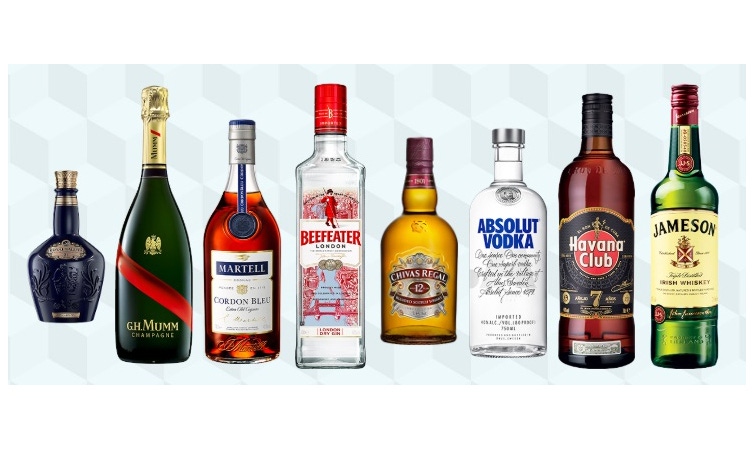
Global packaged spirits company concentrates on recycling, waste reduction and other sustainable improvements for glass bottles and more.
Formed in 1975 when two French companies merged—Pernod was founded in 1805 and Ricard in 1932—Pernod Ricard has built over the past decades an exceptional group of premium international and regional spirits brands known globally from Absolut Vodka to Beefeater to Chivas Regal to select others scattered across an alphabet of iconic products.
Now the company intends to aggressively tighten up the sustainability of an expansive portfolio across various aspects that include packaging, all part of a directive to make a meaningful, positive difference allied with United Nations Sustainable Development Goals (SDGs).
In simplest terms, the company plans by 2025 to ban all promotional items made from single-use plastic and ensure that 100% of its packaging will be recyclable, compostable, reusable or bio-based. Additionally, by 2030 the Group will pilot five new circular ways of distributing wine and spirits and help increase recycling rates in its top 10 largest markets with low recycling levels.
The sustainable movement links directly to the company’s past in a personal way: founder Paul Ricard was a philanthropist who valued his employees, the environment and communities.
“We know that our customers have now come to expect our brands to be responsible and respectful of the environment—values that have been at the very heart of our business since its inception,” states Vanessa Wright, VP sustainability & responsibility. “These 2030 commitments provide us with a focused framework across our business in helping to address some of the biggest sustainability issues, so consumers can enjoy our products in a convivial and sustainable way.”
Wright responds to Packaging Digest’s questions about the program.
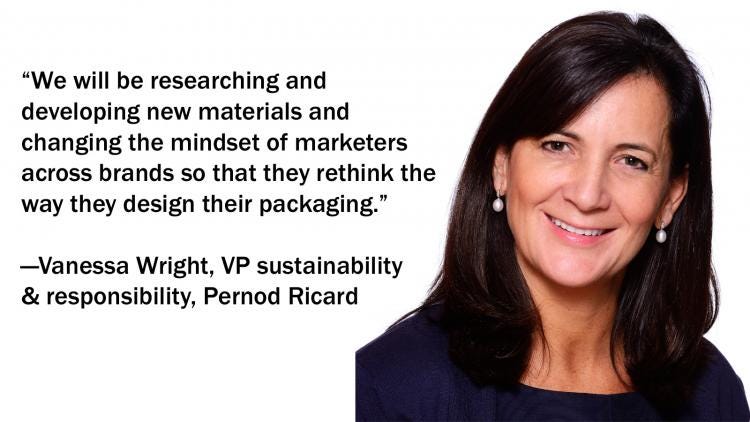
Can you provide specific examples of how the company has improved the sustainability of its packaging?
Wright: Following are recent examples of packaging improvements:
We reduced the weight of our Altos Tequila bottle by 22%.
We increased the recycled content in Absolut Vodka bottles to 43%.
We are in the process of removing Martell Cognac gift boxes in distribution to bars and restaurants.
What’s the hierarchy of the avenues to sustainability—and are these mutually exclusive?
Wright: Our hierarchy in order of priority is: reusable, recyclable, compostable and bio-based. However, they are not mutually exclusive. For example, packaging can be reusable as well as recyclable.
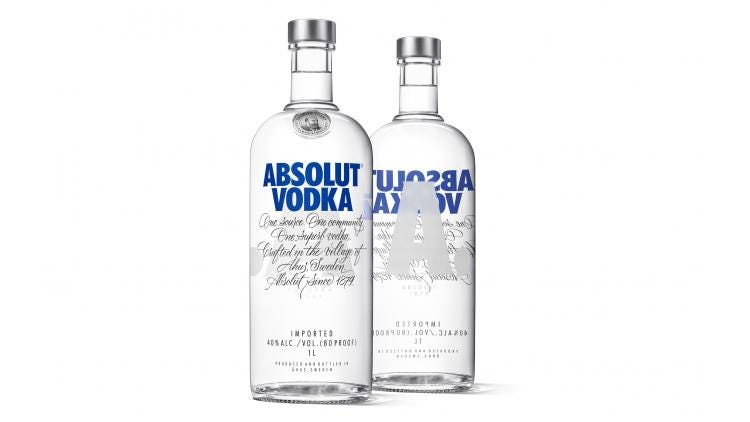
The company increased the recycled content in Absolut Vodka's glass bottles to 43%.
How much effort will this involve beyond current policies and processes?
Wright: It will require efforts in a number of areas including:
Researching and developing new materials.
Changing the mindset of marketers across brands so they rethink the way they design their packaging. Our new strategy provides clearer direction, which we will reinforce through awareness and training programs, and a marketing-led packaging task force.
Partnering with dedicated organizations to explore innovative ways of designing and distributing our products.
Improving the way in which we measure our progress through circular economy indicators.
What metrics or measurable indicators will be used to gauge progress and success?
Wright: Leading indicators for measuring our progress include…
Percent of packaging that is recyclable, reusable, compostable or bio-based;
Percent of recycled content in glass and plastic;
Percent of cardboard certified;
Percent of new packaging achieving reduction according to life-cycle assessment;
Number of markets with significant actions improving recycling;
Percent of single-use plastic at point of sale.
Next: LCA, single-use plastics, glass bottles and more
___________________________________________________________________________________
Have a thirst for packaging technology? PackEx Toronto June 4-6, 2019 will serve up the latest innovations in containers and design, solutions in machinery and automation and free education at Centre Stage. For more information, visit PackEx Toronto. ___________________________________________________________________________________
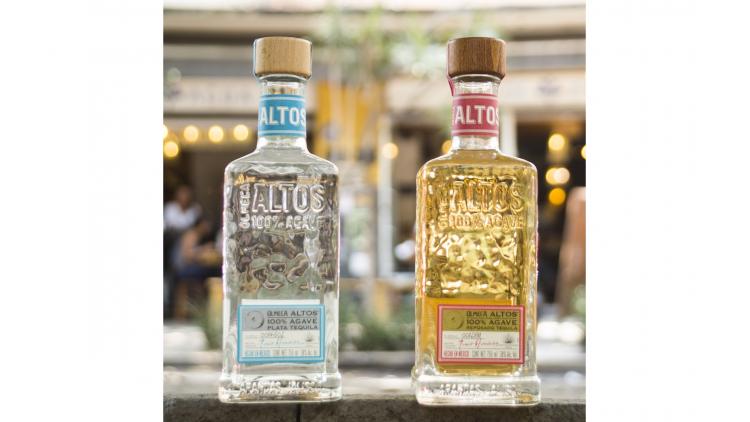
Lightweighting of glass bottles: The company was able to reduce the Altos Tequila bottle by 22%.
To what degree will LCA studies guide your decisions vs. public opinion?
Wright: We will use LCA studies to compare the same materials and study improvements from different solutions. To move from one material to another, we will use LCA studies as well – but not exclusively. Recyclability of the material will be another indicator, along with recycling rates across countries. Our aim is to not only look at environmental impacts, but also to increase packaging circularity.
Would the company ban a “single-use” plastic container if it’s likely to be recycled?
Wright: Our goal is to ban all single-use plastic promotional items. Related to packaging, we will still use PET plastic bottles in markets where recyclability is high—like Finland—as PET bottles are technically recyclable.
What are the special sustainability challenges for a bottled beverage company compared to other markets?
Wright: We do not see any special advantages or disadvantages as a beverage company compared to say a food company. Ultimately, we believe that all actors and industries should try to reduce their packaging in order to reduce waste.
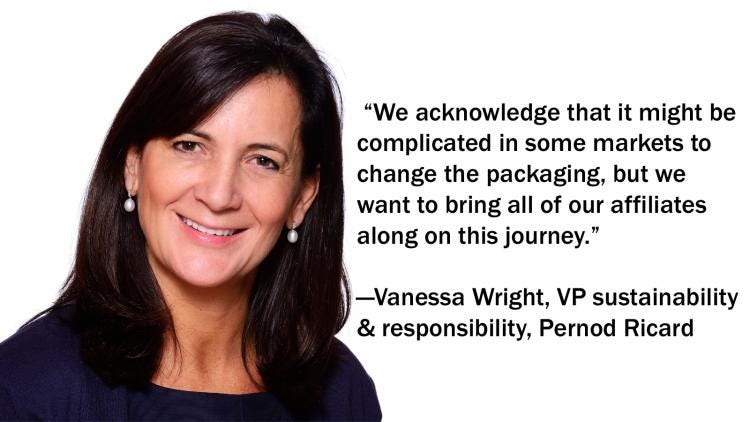
The company relies heavily on glass bottles, might that change?
Wright: Because glass accounts for 85% of our packaging, we are engaged in efforts across markets to improve recycling and reuse:
In Europe, Pernod Ricard contributes around €6 million annually to a system that improves the collection and recycling of domestic packaging, including glass.
In the U.S., Pernod Ricard USA joined the Glass Recycling Coalition, which unites manufacturers, bottlers and recycling service providers in fostering efficient and economically viable recycling channels.
In Brazil, the Group affiliate joined the Glass is Good project to increase the glass recycling rate.
In India, empty bottles are collected in cafés, hotels and restaurants and washed before being reused at production sites, saving between 10,000 and 20,000 tons of glass each year.
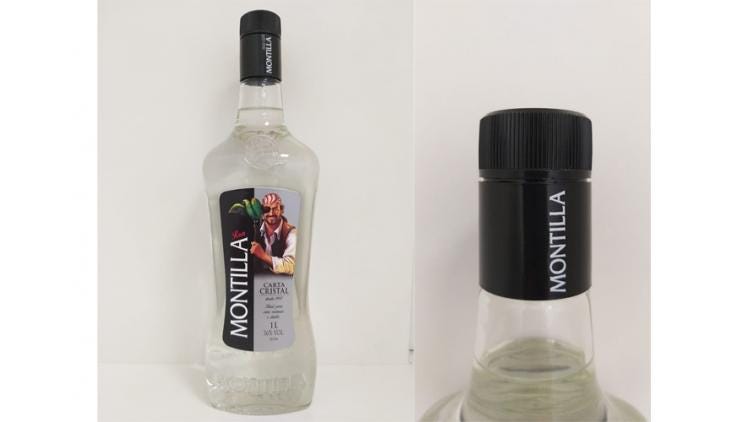
Bottles of regional favorite Montilla rum are topped with bio-based caps in Brazil.
To what degree can the company standardize its packaging?
Wright: We will define general rules that our 86 affiliates around the world will have to follow. We acknowledge that it might be complicated in some markets to change the packaging, but we want to bring all of our affiliates along on this journey. We understand that different markets will work at different speeds to fully integrate the rules. We will also take specific measures in markets where recycling is low, including the U.S.
Have you identified those 10 largest markets to help increase recycling rates or will those be determined in the future closer to 2030?
Wright: The two markets we have identified to date are the U.S. and China. We are working to identify other markets with high potential to make an impact.
Can you disclose anything more about the “5 circular ways”…and might it look something like the Loop program?
Wright: We are exploring options, including Loop, and also other models that will ensure the circularity of our packaging.
Plastics straws are under a lot of environmental pressure so it was interesting to see that the company is working with Loliware, which introduced straws made of seaweed.
Wright: We have worked with Loliware over the past year to promote the brand and its straws, which starting shipping to early adopters last month. We introduced the product to our U.S. employees on Earth Day, with founder Chelsea Fawn Briganti, and will be incorporating them more broadly into our products and experiences in the near future.
Final thoughts?
Wright: Two things:
Improving the sustainability of our packaging is very important to us as a consumer-centric business that embraces the call for increased transparency and provenance.
Among the motivations for our packaging ambitions is reducing carbon emissions. We have committed to reducing our carbon footprint by 50% by 2030—with 30% through packaging innovations.
___________________________________________________________________________________
Have a thirst for packaging technology? PackEx Toronto June 4-6, 2019 will serve up the latest innovations in containers and design, solutions in machinery and automation and free education at Centre Stage. For more information, visit PackEx Toronto. ___________________________________________________________________________________
You May Also Like


